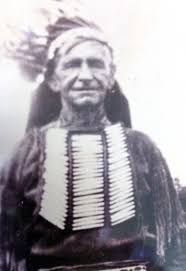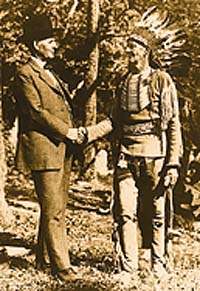By using our website, you agree to the use of cookies as described in our Cookie Policy
NINE YEARS WITH THE APACHES AND COMANCHES - Part One

From J. Marvin Hunter’s Frontier Times Magazine, July, 1954
Written by JOHN WARREN HUNTER in 1906
The father and mother of Herman Lehmann came over from Germany with the Prince Solms Colony in 1846, and settled at Fredericksburg, Gillespie county, Texas. Some time after the close of the Civil War they secured a large tract of land on Beaver creek, about twenty-five miles northwest of Fredericksburg. On this land they built their frontier cabin and engaged in farming on a small scale, and stock raising. From the beginning of the Civil War and up to 1872 the Indians made their periodical raids into Gillespie and adjoining counties, extending their depredations as far south as Austin and nearly to San Antonio, and the sod of many of the smiling valleys of these border counties had been encrimsoned with the blood of these hardy pioneers while endeavoring to establish in the wilderness a home for their families.
The valleys of Beaver creek and its tributaries offered an inviting field for the daring pioneer, and two or three other German families located near the Lehmann ranch and these, although several miles apart, formed the nucleus of a small settlement. The soil along these valleys was exceedingly fertile; springs abounded, timber was plentiful, the range excellent, and there was plenty of game. With these natural advantages and despite the raids of the Indians, during which numbers of their horses were driven off and their cattle maimed and slaughtered, these colonists prospered beyond precedent, and today their descendants are among the most prominent in point of intelligence and wealth of all the citizens of Mason and Gillespie counties.
In the month of May, 1869, Herman, Willie and Caroline Lehmann and a smaller sister had been sent by their mother to frighten the birds from the wheat field not far from the house. These innocent children, not suspecting danger, tarried at play in the field, until they were startled by the appearance of a large body of mounted Apaches. The father and elder brother, G. A. Lehmann, were away from home, and it seemed for a moment that the entire family was at the mercy of the savages. Two Indians dismounted and entering the field, soon ran down and seized the children, the distracted mother and her elder daughters witnessing the proceedings from the house, but dared not go to the rescue. Herman was about eleven years old and quite active. Willie was about two years younger. When the two Indians seized these children the two boys put up a brave struggle while being dragged to the field fence, near which was a growth of small bushes. These they seized and held to with the energy of despair and this proved the salvation of the two little girls. It seems that the Indians who remained mounted were some distance from that part of the field fence approached by the two savages with their captives. When the Indians reached the fence they found that each would have to pick up a boy and throw him bodily over the obstruction. One Indian threw the girls over the fence and turned to assist his comrade with the boys. The little girls, once over the fence and on the side next to the house, urged by the mother's call, ran with all speed for the home shelter, The mounted Indians, watching the proceedings, gave chase and followed the fleeing children to the yard gate, discharging a flight of arrows during the brief pursuit, several of which pierced the clothing worn by the girls.
When the Indians reached the gate, doubtless they would have entered the yard, but seeing a gun in the hands of the intrepid Mrs. Lehmann, they hastily withdrew. Herman and Willie were securely tied on the horses, none too gentle, and led away, the Indians going in the direction of House Mountain, gathering horses along the route. When seven miles east of Loyal Valley the savages changed their course and traveled in the direction of the Llano river, where they divided, six going in one direction and another six going to Willow creek, east of Mason, where they encamped. A calf was killed, its stomach removed and the milk it contained was ravenously devoured by the Indians, who seemed to regard it as a rare delicacy. The two little captives had been released from their horses and were exceedingly hungry. The entrails of the calf were offered them as food, and on refusing the nauseating diet, Herman was seized by an Indian, who with a knife made an incision, thrust the boy's head into the calf's paunch, rubbed the contents therein contained over the lad's head, face and body. The captives were next offered the liver and heart and compelled to eat of them while warm with the animal heat. The six Indians with a large bunch of horses which they had stolen joined the others at this encampment, and after an hour's rest, the band again divided and took a course bearing north of Mason, and in the direction of Menardville. The captive boys suffered intensely from the effects of hunger and sunburn. They had been stripped of all their clothing and exposure to the sun had burned the surface of their arms, shoulders, and back to a festering blister. The Indians crossed the San Saba near the old Block House and followed the divide in the direction of Kickapoo Springs, which point they reached in the night. Near these springs they crossed the road leading from Fort Concho to Fort McKavett and along which there was more or less travel every day. Having by this time a large drove of horses, they left the plain trail, which the troops at either post could have easily followed. From the point where they crossed the road they bore in the direction of Twin Mountains, west of Fort Concho. At these mountain peaks they halted in the afternoon, cooked their beef, changed horses and at dark they lighted signal fires on the summit of one of these elevations. Why they did this the captive boys did not know at the time, but after a long residence with the Apaches he learned that it was their custom when on the return from a successful raid to build signal fires on high peaks in order to warn any of their tribe who might be going in on a like raid of their presence and success. Leaving the Twin Mountains the Indians followed a course leading up the North Concho to the plains, and after eight or ten days travel they reached the village, which, according to Herman's recollection, must have been in the mountains of New Mexico.

As before stated, it was in the night when they reached the Kickapoo Springs. They had been continuously on the move since the capture of the two boys, and even an Indian's endurance is not proof against the demands of rest and sleep. Willie Lehmann, the younger of the two captives, was not bound as was his brother, but mounted behind an Indian. The child was almost exhausted from the long ride, hunger, loss of sleep and the burning fever that resulted from sunburn. After leaving the springs he noticed the Indian behind whom he was mounted kept closely in the rear of the cavalcade, and that he was nodding. Slowly inching back on the crupper, so that no part of his body came in contact with that of the savage, he bided his time. It was not long until the Indian slowly leaned forward over the withers of his horse — asleep! Seizing the opportunity, the boy quickly slid backward into the tall grass, where he lay until all sound of the retreating enemy had died away. Although on the verge of extreme exhaustion, the child had every reason to believe that the Indians would return and institute search, and his first impulse was to get as far away as possible from the scene of his escape and not to follow the back trail. Shaping his course as best he could by the stars and the direction he came, the weary, suffering boy traveled all night. When dawn came he found a pool of water in a small creek. Into this he plunged, slaked his raging thirst and sought to cool the fever that was consuming his vitals.
He spent some time in this pool, and caught a number of frogs, which he ate with avidity. Near the water was a dense thicket, and in this he found concealment and slept all day. It must be remembered that the little boy was in a state of nudity, the Indians having, through a spirit of cruel wantonness, deprived him of all his clothing. It was sundown when he awoke. His sleep had been most refreshing, his fever had subsided, and he felt greatly refreshed, although ravenously hungry. He went to the pool to try to secure a few frogs for his evening meal, but darkness soon came on and rendered his efforts in that line futile.
_____________________________________
Enjoying this story?
_____________________________________
Leaving the pool, he resumed his travels, suffering at each step the most excruciating pain. He traveled all night and in the morning he came to the San Saba, a few miles below Pegleg crossing. Here he secured a few frogs, and realizing that his strength was rapidly failing and believing the danger of pursuit and recapture was past, he decided to travel during the day. Wearily and slowly he pushed on, and late that evening he was seen by two ranchmen, painfully wending his way in an open stretch of country, supposedly near where the village of Hext now stands. In his fright the little boy fled when he saw these men approaching, but overtaking him, they convinced him that they were friends. He told them of his capture, escape and suffering. They noticed that he held something in his hand as if he would conceal it. Upon investigation they found that it was the entrails of a bird, deftly wrapped in leaves. The boy told how he had come upon a covey of partridges, had thrown a stone and luckily killed one, and had eaten it raw, and that, fearing he would find nothing else to eat soon, he had preserved the entrails to be eaten later. These coarse, uncouth men wept when they heard the child's simple story, and when they realized the little fellow's forlorn condition they took him tenderly in their arms and bore him to the nearest ranch, where he received every attention. Clothing was given him, and when he was able to travel he was taken to his home on Beaver creek.
A short time after the occurrences above related, the Apache s made another raid in the Beaver creek settlement and made the Lehmann home their point of open attack. It seems that Mr. Lehmann had only a short time before erected a new house some little distance from his former place, and had moved in before the structure was completed. It was a box house, with a porch in front and a shed room on the opposite side. Two large windows were in the ends of the main building and these windows were incomplete, they having neither blinds nor shutters. An account of this attack is best told by Mrs. Mina Keyser, a daughter of Mr. and Mrs. Lehmann, who, then a girl, participated in the defense of her home and proved herself a heroine in the fullest sense. She says:
"In 1869, two months after Herman was stolen, father and Adolph were away about a mile and a half irrigating land, Willie and I drove the horses to water. On the west side of the creek was a high bluff and while the horses were drinking a big rock rolled down the bluff and struck near us. I told Willie that we must run home; that it might be Indians. We waded into the water and drove the horses out. Not having enough water, they went reluctantly. But we hurried them to the pasture and then ran to the house. Mother had to do all the sewing for her large family by hand in those days, so she put me to stitching up the long straight seams. We had not been sitting there long until the dog began to bark. I looked out to see what he was barking at but could see nothing. In a few minutes he set up barking again and we thought father was coming home with the cows and calves, and as he always scolded if the gate was not opened, I rushed toward the gate, and to my horror, there came twelve big Indian warriors in a gallop, holding their shields before them, moving to and fro like snakes, their long hair dangling in the air. How hideous and frightful they looked! They did not yell or make any more noise than was necessary. Silence is a characteristic trait of the Apache, while the Comanche always shouted, yelled and made all the noise possible. They rode around the house, about fifty yards away, the first round, but kept circling, coming a little nearer each time. I fetched in the axe and we closed and barred the doors. The smaller children were terribly frightened and mother was somewhat nervous from excitement, seeing we had to contend against such fearful odds, but we silently set up our petitions to the Great Providence. At first I trembled and a sense of fainting came over me, but all this soon passed and I felt bold and determined — even furious. By this time the Indians had closed in on us, and began throwing rocks and sticks through the windows. I pushed the children under the bed, but they kept trying to crawl out. When the Indians first surrounded the house mother wanted to shoot, but I advised her not to do so until they attempted to enter the room. Finally the chief ventured to appear in the window. I held the gun and mother took aim and pulled the trigger, and the Indian dropped. The full force of the charge struck his shield and glanced into his abdomen. Several other Indians approached and we fired our second shot, again striking a shield, but this time the shot scattered, wounding two or three. I forgot to tell you they had captured all the horses. At first they fired about twenty shots with their short guns. As they came more closely to the house mother looked out through the window and whiz! came a lance, passing close to her temple and stuck in the table nearby. After a few more charges in which they were careful not to expose themselves to shotgun fire, they gave up the siege and galloped away. When father and Adolph came they were so enraged, they wanted to follow them, but we persuaded them not to go. When the Indians disappeared and we opened the door, there stood our faithful old dog, Max. Several lance wounds and the torn up turf in the yard showed that the brave old dog had done his part, but his honest eyes looked pleadingly into those of his mistress and then he fell over exhausted from the loss of blood. Part of the time during the fight I stood by one of the windows with a long cane knife while mother guarded the other with an axe. Some of the Indians went into the other room, took all the blankets, broke up the furniture, cut open the feather beds, and wrecked things generally. The Indian that mother shot was the very villian that stole Herman, and when he returned to the village he gave Herman a terrible beating. It was their custom to punish their captives when one of the warriors was wounded while on a raid, and should one of the warriors be killed, one of their captives was slain. Had one of those wounds proved fatal, Herman would have been put to death, and thus, indirectly, mother would have been the cause of the death of her own son. When they reached their village, they showed Herman clothes belonging to our family, besides blankets and trinkets they had taken from us, some of which he recognized. Among other things was a small pistol which he had often played with. They told Herman that all his folks were killed in the fight. I shall never get over that experience. I am now excited when I think of those painted faces and fencerow motions."
End of part one. Read part two here.
Meanwhile, look at this incredible deal!
Click HERE for the deal:
‹ Back






Comments